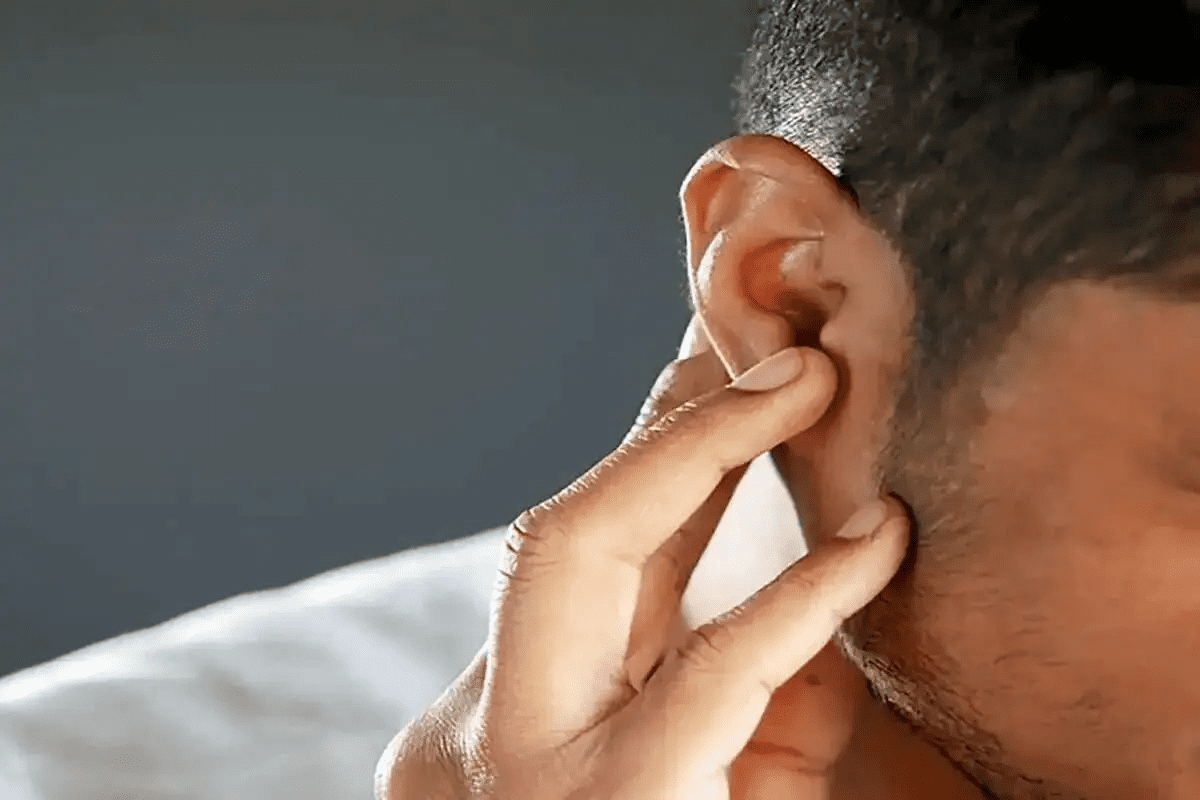
Ear infections are common in both kids and adults around the world. At Liv Hospital, we know how worried you can get when you have symptoms like vomiting associated with ear infections. This could mean a more serious problem, like an inner ear issue.
When an ear infection reaches the inner ear, it can cause swelling. This swelling can mess with the vestibular system, leading to nausea and vomiting. It’s important to know the signs of a serious infection to get the right medical help. We’re here to support you with top-notch care and treatments for patients from all over.
If you experience ear infection vomiting, it is often linked to inner ear inflammation (labyrinthitis) causing severe vertigo.

Ear infections are a big health issue worldwide. They can happen to anyone, but some groups get them more often.
Ear infections are divided into outer, middle, and inner types. Each has its own symptoms and effects.
Ear infections are a big deal, mostly for kids. Over 80% of children get at least one by age three. Adults get them too, but it’s less common, about 20%.
Age Group | Prevalence of Ear Infections |
Children under 3 years | More than 80% |
Adults | Approximately 20% |
Knowing these stats helps us understand ear infections better. It helps us know who’s at risk and how to treat them.

Knowing the signs of ear infections is key for quick treatment. Ear infections show up in different ways, based on the type and how bad it is. We’ll cover the common symptoms of various ear infections to help you spot them early.
Mild ear infections often cause ear pain, hearing troubles, and fluid drainage. These symptoms can be annoying and might mess up your day. It’s important to notice these signs to get medical help on time.
Other mild symptoms include feeling like your ear is full, itching, or discomfort. If you notice any of these, keep an eye on them. And if they get worse or don’t go away, see a doctor.
Inner ear infections can have more serious symptoms. These include hearing loss, vertigo, dizziness, nausea, and vomiting. These happen because the inner ear helps with balance and equilibrium. When it gets inflamed, it can cause big problems.
If you have vertigo or severe dizziness, get medical help right away. Inner ear infections need careful treatment to avoid serious issues.
Spotting ear infection symptoms early can really help treatment work better. By knowing the signs of mild and serious ear infections, you can take care of your health better.
Inner ear infections can upset our balance, leading to nausea and vomiting. This happens because of the vestibular system. It’s key for our balance and how we see space.
The vestibular system is in our inner ear. It keeps us balanced and steady. An infection here can cause inflammation and mess with its work.
This mess can send wrong signals to the brain. We might feel dizzy, off-balance, or sick to our stomach. These are signs of trouble.
When the vestibular system is hurt by an infection, the brain gets mixed messages. It’s confused about where we are and how we move. This can make us feel sick and want to throw up.
How bad we feel can depend on the infection and our health. Knowing this helps us deal with symptoms better. It also tells us when to see a doctor.
Ear infections can cause vomiting, showing a problem with the vestibular system. It’s key to know the causes and symptoms.
The vestibular system helps us stay balanced. An ear infection can upset this, causing vertigo, nausea, and vomiting. Vestibular-related vomiting starts suddenly and is linked to head movements.
Look out for these signs:
People with ear infections may also have ear pain, fever, and trouble hearing. Spotting these symptoms is important for knowing how serious the infection is and getting the right treatment.
Keep a close eye on these symptoms and get medical help if they get worse or if the infection seems severe.
Knowing the symptoms of ear infection vomiting is key to getting the right care. By understanding these signs, people can handle their condition better.
Ear infections can happen at any age, but children are more likely to get them. This is because of their body shape and growing immune system. Ear infections are a big health problem worldwide, hitting kids hard.
There are a few reasons why kids get ear infections more often. Their Eustachian tubes are shorter and more horizontal than adults’. This makes it easier for germs to get into the middle ear. Also, kids’ immune systems are not fully grown, making them more open to infections.
The signs and how bad ear infections are can change a lot between kids and adults. Kids usually show symptoms like ear pain, fever, and being really upset. Adults might feel ear pain, have trouble hearing, or get ringing in their ears. The infection can also be more serious in kids, leading to hearing loss or speech problems if not treated.
Age Group | Common Symptoms | Potential Complications |
Children | Ear pain, fever, irritability | Hearing loss, speech delays |
Adults | Ear pain, hearing loss, tinnitus | Persistent hearing loss, vertigo |
Knowing these differences is key for the right treatment. If you think you or your child has an ear infection, see a doctor right away.
Understanding the connection between ear infections and vomiting is key for diagnosis and treatment. Accurate diagnosis is essential for effective treatment. We will explain how to diagnose the cause of vomiting in patients with ear infections.
Diagnosis includes medical history, physical exam, and tests. When you see your doctor, they will first ask about your symptoms and past ear infections. This helps them understand your situation better.
A physical exam is important. Your doctor will use an otoscope to look at your ear canal and eardrum. They will check for signs of infection like redness or fluid.
Diagnostic tests may include:
Your doctor will ask several questions to better understand your symptoms. They might ask:
Being ready to answer these questions helps your doctor make an accurate diagnosis. They can then create an effective treatment plan for you.
Understanding how to treat ear infections with vomiting is key to getting better. When an ear infection makes you vomit, it’s a sign of a serious infection. We’ll look at different ways to treat symptoms and cure the infection.
Doctors use a mix of medicines and therapies to treat ear infections with vomiting. Antibiotics fight bacterial infections. Pain management medications help with ear pain and discomfort.
There are also home remedies and self-care tips to help manage symptoms. These include:
It’s important to stick to your treatment plan and talk to your doctor if symptoms don’t get better. Combining medical treatments with home remedies and self-care can help manage ear infections with vomiting and aid in recovery.
Living with an ear infection can be tough. But knowing how to handle daily tasks can help a lot. We’ll look at how to manage everyday activities and what precautions to take for a smooth recovery.
Showering with an ear infection needs some care. It’s usually okay to shower, but don’t let water get into your ear canal. Use earplugs or cotton balls with petroleum jelly to keep your ears dry.
Tips for showering with an ear infection:
The time it takes for an ear infection to heal varies. It depends on the type of infection and how well treatment works. Usually, most ear infections get better in a few days to a week with the right treatment.
Factors influencing recovery time:
When you have an ear infection, it’s important to avoid certain activities. This helps prevent more problems and helps your ear heal. Stay away from things that might irritate your ears or make the infection worse.
Recommended activities during recovery:
By following these tips, you can make your recovery smoother. This helps lower the chance of more problems.
Knowing when to get medical help is key to handling ear infections well. We’ve talked about symptoms and what they mean. It’s important to know when you need to see a doctor right away.
If you have severe ear pain, a high fever, or are vomiting because of an ear infection, see a doctor. These signs might mean you have a serious issue that needs quick treatment.
Knowing how to spot the start of an ear infection and its symptoms helps you get medical help fast. If you’re not sure about your symptoms or how to handle them, it’s best to see a doctor. This can help avoid serious problems.
Being aware of when you need medical help ensures you get the right care. This helps you recover from an ear infection and avoid long-term issues.
Ear infections show symptoms like ear pain, fever, and hearing loss. If you notice these signs, see a doctor for a correct diagnosis.
Adults might feel ear pain, fever, and hearing loss. They might also feel like their ear is full. Some may feel dizzy or nauseous, if the infection is in the inner ear.
Inner ear infections cause dizziness, vertigo, and nausea. You might also hear ringing in your ears or feel like your ear is full. If you have these symptoms, get medical help.
Yes, an inner ear infection can make you vomit. This happens because the infection messes with your balance system. If you’re vomiting and have other ear infection symptoms, see a doctor.
How long an ear infection lasts depends on its type and how bad it is. Mild infections might go away in a few days. But, more serious ones might need treatment and take longer to heal.
It’s usually okay to shower with an ear infection, but be careful. Don’t let water get in your ear. Also, avoid underwater activities or using earbuds that can push water in.
If you have severe symptoms like intense ear pain, high fever, or vomiting, get medical help. These signs can mean a serious infection that needs quick treatment.
Treatments for ear infections that cause vomiting include antibiotics and medications for dizziness and nausea. Sometimes, therapy to help with balance is recommended.
To deal with daily life with an ear infection, avoid activities that make symptoms worse. Try home remedies like a warm compress on your ear or over-the-counter pain relievers.
If you have severe symptoms like intense ear pain, high fever, or vomiting, get medical help. Also, if your symptoms get worse or don’t get better with treatment, see a doctor.
Morgenthaler, T. I., Kagramanov, V., Hanak, V., & Decker, P. A. (2006). Complex sleep apnea syndrome: Is it a unique clinical syndrome? Sleep, 29(9), 1203-1209. [https://academic.oup.com/sleep/article/29/9/1203/2708307]
Subscribe to our e-newsletter to stay informed about the latest innovations in the world of health and exclusive offers!
WhatsApp us